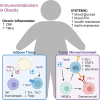Microenvironmental influences on T cell immunity in cancer and inflammation
- PMID: 35039633
- PMCID: PMC8762638
- DOI: 10.1038/s41423-021-00833-2
Microenvironmental influences on T cell immunity in cancer and inflammation
Abstract
T cell metabolism is dynamic and highly regulated. While the intrinsic metabolic programs of T cell subsets are integral to their distinct differentiation and functional patterns, the ability of cells to acquire nutrients and cope with hostile microenvironments can limit these pathways. T cells must function in a wide variety of tissue settings, and how T cells interpret these signals to maintain an appropriate metabolic program for their demands or if metabolic mechanisms of immune suppression restrain immunity is an area of growing importance. Both in inflamed and cancer tissues, a wide range of changes in physical conditions and nutrient availability are now acknowledged to shape immunity. These include fever and increased temperatures, depletion of critical micro and macro-nutrients, and accumulation of inhibitory waste products. Here we review several of these factors and how the tissue microenvironment both shapes and constrains immunity.
Keywords: T cell; cancer; immunometabolism; inflammation; microenvironment.
© 2022. The Author(s), under exclusive licence to CSI and USTC.
Conflict of interest statement
JCR is a founder, scientific advisory board member, and stockholder of Sitryx Therapeutics, a scientific advisory board member and stockholder of Caribou Biosciences, a member of the scientific advisory board of Nirogy Therapeutics, has consulted for Merck, Pfizer, and Mitobridge within the past 3 years, and has received research support from Incyte Corp., Calithera Biosciences, and Tempest Therapeutics.
Figures



References
Publication types
MeSH terms
Grants and funding
LinkOut - more resources
Full Text Sources
Medical

